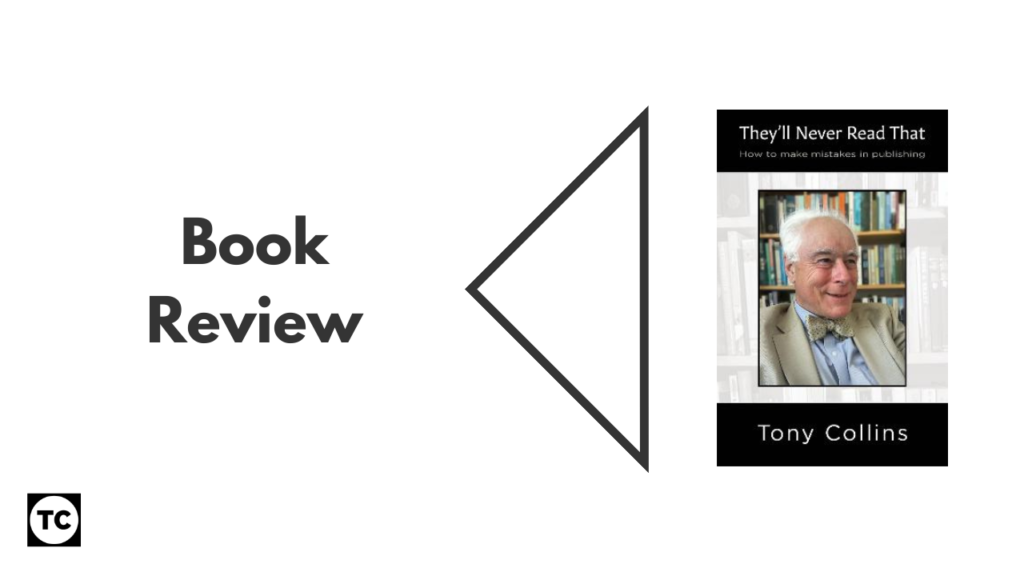 About a year into my first stint in publishing, at SPCK (whom I now work for again but exclusively focusing on IVP), we were told one day that a legend of the Christian publishing world was joining us, to work on some projects. As a non-publishing person by background (I just like books!) I did not realise at the time just how appropriate, whether or not I like all his books or ideas, that appellation is for Tony Collins. At what would be his final SPCK Christmas party, I got a volume of Betjeman poems from the secret santa sack – the reader will guess who put that in there.
About a year into my first stint in publishing, at SPCK (whom I now work for again but exclusively focusing on IVP), we were told one day that a legend of the Christian publishing world was joining us, to work on some projects. As a non-publishing person by background (I just like books!) I did not realise at the time just how appropriate, whether or not I like all his books or ideas, that appellation is for Tony Collins. At what would be his final SPCK Christmas party, I got a volume of Betjeman poems from the secret santa sack – the reader will guess who put that in there.
Tony Collins will need no introduction to some – to others, it might be worth mentioning publishers like Hodder, Kingsway, SPCK and Lion. Chances are, if you are a Christian and speak or read English, you’ve probably read a book that he’s been involved in.
This could have been quite an introspective book – but the authors charm, writing skills and frankly hilarious and fascinating story mean that it is a book that deserves a wider readership than you might imagine. However, I think this is a book that I will reread every couple of years, because Tony’s observations about publishing and hard-won experience of editing in particular are valuable and not often captured in this sort of format.
For a sample of what I mean:
- “Each area had its specialists, but an editor (the generalist of the publishing world) needed to know something of them all. Then there were matters more strictly editorial: readership, structure, subheads, flow, indexes, libel, copyright, permissions, the merits of anecdote, the art of cover copy – an entire litany of esoteric aspects for which years of literature studies had failed to equip me.” // absolutely! I’ve been shocked at how much I don’t know, and yet how much of my editorial role is not editorial. Thankfully, the wider teams are all made up of specialist experts.
- “Publishing, I gradually realised, was largely about people. Leading Christian authors turned to Hodders not so much because of the company’s stellar reputation, but because Mr England would be their editor.” // The people point is vital. Though not all roles in a publisher, at least in my experience, require a social butterfly, the work does involve interacting with a wide range of people.
- “There’s a theological aspect to this. It depends where your security lies. If you march to a beat measured out by the respect of your peers, or the solidity of your bank balance, then you probably shouldn’t go into publishing, which is really a form of legal gambling. You especially – and this has grown more true with the passing years – should not become a Christian publisher, where the risks are incessant and the margins mostly derisory. But if your security is in Christ; if you are part of a church which hearkens to the voice of the Spirit; if the coin you desire cannot be counted, but may be measured in lives touched and transformed: then to publish well can be a source of blessing, both to you and to those whose minds and spirits are stirred.” // This has a wonderful ring of truth, and is something that I need to remind myself of when a book I’ve commissioned is doing well, when it isn’t, and on all the other occasions.
- “Good fiction tells the truth more surely and more fully than nonfiction; a great story will carry truth past the watchful dragons of the mind, in C.S. Lewis’s memorable phrase. The door of the imagination is for many people the most helpful entry point to the gospel. That’s why Jesus told parables.” // I don’t totally agree but I do see his point. And it’s this sort of observation that makes this book a joy to read – it makes you think.
- “What can you do when a successful author goes spiralling off into make-believe? Part of an editor’s function is to ask awkward questions, fully aware that to do so may damage the relationship for good.” // This is vital. And I found it deeply encouraging. Particularly in the confessionally evangelical context of IVP, it’s good to remember that truth is important – and asking questions is vital.
- “Write so compellingly that your reader misses his train“. Amen
I could share more quotes, but I’ll leave it there. This is both an enjoyable autobiography of sorts, and a book about publishing and particularly editing. There were things I disagreed with, a few moments I wasn’t quite sure what was going on, and a good deal of laughter. This book was a joy to read and I’m glad it exists. If this review has piqued your interest, then you’d probably appreciate reading it.
Leave a Reply